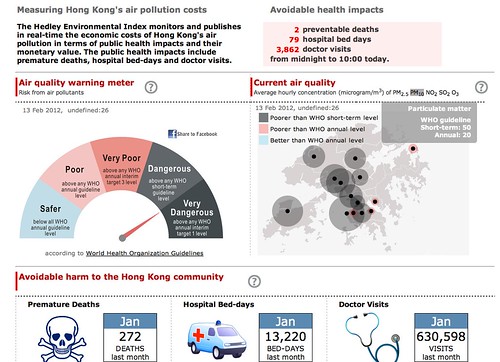The air quality in Hong Kong is a constant returning topic of discussion. Where does it come from, who is responsible, how do we measure it, what is good and what is bad. A major pain point is that the government only publishes the so called PM10 data which refers to the size of particles in the air. The size of those particles also determines how deep they can penetrate in the body, and thus directly related to the damage they can do. For whatever reason there is no current data published on the so called PM2.5 measurements in Hong Kong, even though this seems to be an international standard.
The effects of inhaling particulate matter that have been widely studied in humans and animals now include asthma, lung cancer, cardiovascular issues, birth defects, and premature death. The size of the particle is a main determinant of where in the respiratory tract the particle will come to rest when inhaled. Because of their small size, particles on the order of ~10 micrometers or less (PM10) can penetrate the deepest part of the lungs such as the bronchioles or alveoli.[11] Larger particles are generally filtered in the nose and throat via cilia and mucus, but particulate matter smaller than about 10 micrometers, referred to as PM10, can settle in the bronchi and lungs and cause health problems. The 10 micrometer size does not represent a strict boundary between respirable and non-respirable particles, but has been agreed upon for monitoring of airborne particulate matter by most regulatory agencies. Similarly, particles smaller than 2.5 micrometers, PM2.5, tend to penetrate into the gas exchange regions of the lung, and very small particles (< 100 nanometers) may pass through the lungs to affect other organs. In particular, a study published in the Journal of the American Medical Association indicates that PM2.5 leads to high plaque deposits in arteries, causing vascular inflammation and atherosclerosis — a hardening of the arteries that reduces elasticity, which can lead to heart attacks and other cardiovascular problems.[12] Researchers suggest that even short-term exposure at elevated concentrations could significantly contribute to heart disease. A study in The Lancet concluded that traffic exhaust is the single most serious preventable cause of heart attack in the general public, the cause of 7.4% of all attacks.[13] - source http://en.wikipedia.org/wiki/ParticulatesHong Kong government currently seems hung up on some internal processes to get legislation approved. Though, in reality it looks more like they are dragging their feet. An example can be found here, an article by Friends of The Earth describing the "recent" developments with regards to upgrading the AQO's into the 21st century. Question would be why.....
You can argue that the government benefits from creating a healthy environment where people can perform well. With Hong Kong still using expatriate talents, loosing this talent-pool could have a negative impact on things. Articles in international (UK Telegraph) and local media (SCMP) provide examples on people leaving due to the air quality. People return to their home country, or move on to arch-rival Singapore.
What is the impact on the local economy? Then University of Hong Kong its School of Public health keeps a tab on what the daily pollution levels are and translates that into the impact on the economy. The website can be found here with an example of the dashboard below:

It would be interesting to see what course of action government will take in the near future with regards to the local creation of pollution, and what cross border initiatives are developed to adress pollution coming in from mainland China.
The issue is not only a challenge for Hong Kong, people in Shanghai and Beijing are also reconsidering their options. An example is serial entrepreneur Marc van der Chijs who also wrote a blog post about it which can be read here.
Silly enough, it is something you start considering as a part of living here. Checking air-pollution levels when you are about to do some sports outdoors. Heavy smog, irritated eyes, irritated airways and other silly things. People often have sinus problems like colds etc. (yeah - blasting aircons are not helping either). "Funny" bit is that when you are out of town to areas where air quality is better, many of those things disappear within 2-3 days.
Slowly step by step awareness is growing with the people. Organisations like Hong Kong Clean Air Network, Clear the Air Network, and Friends of the Earth work on public and government level to educate and initiate action.
It would be nice if action starts at individual levels, by decreasing polluting activities. Airconditioners on "non freezing"levels, insulation of buildings to keep heat out and cold in, switch of lights when not needed etc. Lets see what will happen next....
update 23 Feb 2012: The Wall Street Journal Blog put an article up called "Hong Kong's Killer Pollution", with an interesting comment of Joanne Ooi from Clean Air Network Hong Kong referring to local traffic being a major source of pollution as well.
No comments:
Post a Comment